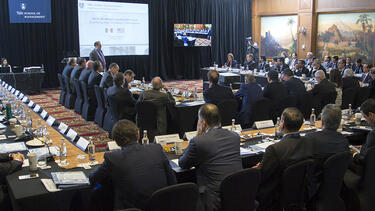Faculty Viewpoints
How Tales of ‘Flippers’ Led to a Housing Bubble
Yale SOM's Robert Shiller writes that widely repeated narratives of getting rich in real estate drove a housing bubble a decade ago—and could do so again.

Insights Animation: The Economic Benefits of Immigration
Do new arrivals in a country take jobs away from the native residents? The picture is much more complex than that, argues Yale SOM’s Mushfiq Mobarak.

Does Macron’s Victory Signal the Defeat of Populism?
Does Emmanuel Macron’s decisive victory over Marine Le Pen in the French presidential election signal an end to the populist wave that has had globalists on edge for the past year? Not so fast.
Can the Police Regain Trust?
The United States is engaged in a fraught debate over the role of police in the community. Yale Law School professor Tracey Meares describes what’s at stake and proposes approaches to reform.
What Is the Future of Globalization?
A wave of nationalism around the world has left many wondering if the trend toward greater global connection has reversed. Global Network Perspectives asked faculty throughout the Global Network for Advanced Management about the future of globalization in their regions.

Is Our Financial System Still at Risk?
Yale’s Andrew Metrick discusses what we learned from the last financial crisis and areas of concern for the future.

Trump’s White House Is a Family Business. That’s Not a Bad Thing.
In a Politico commentary, Yale SOM's Jeffrey Sonnenfeld asks if there are reasons to be optimistic about the responsibilities given to Jared Kushner and Ivanka Trump.

Does Immigration Create Jobs?
Research shows that, contrary to much of the rhetoric on the topic, immigration can contribute to economic growth and expansion of the labor market
What’s the Future of U.S.-Mexico Relations?
Professor Jeffrey Sonnenfeld recently assembled a group of business and political leaders from Mexico and the United States to discuss the state of the strained but critical relationship between the two countries.

How Does Immigration Affect Global Business?
Immigration can help economies become more dynamic and efficient, but inclusive policies often create political landmines. How are countries around the world handling the challenge?
